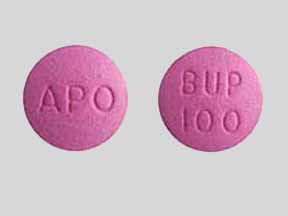
Bupropion Hcl Coupons & Savings Card – Discount Prices from $9.39
Bupropion is an oral medication prescribed for the treatment of depression and seasonal affective disorder (SAD). It is available in both short-acting tablets, which are taken two or three times daily, and long-acting formulations taken once daily. While the exact mechanism of action is not fully understood, bupropion is believed to enhance the balance of norepinephrine and dopamine in the brain, contributing to mood improvement. Notably, bupropion tends to cause fewer sexual side effects compared to other antidepressants. However, it may not be suitable for individuals with a history of seizures, eating disorders, or those who consume alcohol frequently. Always consult your healthcare provider for personalized medical advice before starting or changing any medication regimen.
Our coupons are free to use. Before paying, show the pharmacist your Bupropion Hcl savings card to get your free discount. Use our filters below to edit the prescription box to match your needs. The Bupropion Hcl prices will update based on your prescription needs. Above our Bupropion Hcl coupons, you can change your location to see pharmacy prices and costs in other areas. We're here to help you buy Bupropion Hcl at the lowest price with our prescription discount card.
My prescription
Edit
100MG, Bupropion Hcl (30 Tablets)
Select pharmacy

CVS
$20.05
COUPON PRICE
Albertsons
$9.39
COUPON PRICE
Walgreens
$12.69
COUPON PRICE
Walmart
$13.00
COUPON PRICEBupropion Hcl savings card
Show this card to your pharmacist
Albertsons
$9.39
BIN
ID
PCN
GRP
011867
LHDE22A2A4
HT
LABH001
Powered by
Bupropion is an oral medication prescribed for the treatment of depression and seasonal affective disorder (SAD). It is available in both short-acting tablets, which are taken two or three times daily, and long-acting formulations taken once daily. While the exact mechanism of action is not fully understood, bupropion is believed to enhance the balance of norepinephrine and dopamine in the brain, contributing to mood improvement. Notably, bupropion tends to cause fewer sexual side effects compared to other antidepressants. However, it may not be suitable for individuals with a history of seizures, eating disorders, or those who consume alcohol frequently. Always consult your healthcare provider for personalized medical advice before starting or changing any medication regimen.
Our coupons are free to use. Before paying, show the pharmacist your Bupropion Hcl savings card to get your free discount. Use our filters below to edit the prescription box to match your needs. The Bupropion Hcl prices will update based on your prescription needs. Above our Bupropion Hcl coupons, you can change your location to see pharmacy prices and costs in other areas. We're here to help you buy Bupropion Hcl at the lowest price with our prescription discount card.
More prescriptions for depression
coupons from$18.01Save 91%
coupons from$189.84Save 86%
coupons from$27.64Save 60%
coupons from$532.00Save -4%
coupons from$213.32Save 79%
coupons from$21.50Save 82%
coupons from$42.64Save 70%
coupons from$27.64Save 60%
More prescriptions for depression
Desvenlafaxine Succinate ER Save 91%coupons from $18.01
Zonalon Save 86%coupons from $189.84
Vilazodone Save 60%coupons from $27.64
Trintellix Save -4%coupons from $532.00
Drizalma Sprinkle Save 79%coupons from $213.32
Paxil Save 82%coupons from $21.50
Silenor Save 70%coupons from $42.64
Viibryd Save 60%coupons from $27.64
Bupropion Hcl dosage forms
Use our Bupropion Hcl 75MG coupon with prices from $11.94 for 30 Tablets. You can also use our Bupropion Hcl 75MG coupon with prices from $14.87 for 60 Tablets. We have a Bupropion Hcl 75MG coupon with prices from $23.73 for 90 Tablets. You can use our Bupropion Hcl 75MG coupon with prices from $26.64 for 120 Tablets.
Dosage Quantity Price from Per unit 75MG 30 Tablets $11.94 $0.40 75MG 60 Tablets $14.87 $0.25 75MG 90 Tablets $23.73 $0.26 75MG 120 Tablets $26.64 $0.22 75MG 180 Tablets $32.46 $0.18 100MG 30 Tablets $12.69 $0.42 100MG 60 Tablets $16.38 $0.27 100MG 90 Tablets $25.92 $0.29 100MG 180 Tablets $36.81 $0.20 100MG 270 Tablets $42.07 $0.16
| Dosage | Quantity | Price from | Per unit |
|---|---|---|---|
| 75MG | 30 Tablets | $11.94 | $0.40 |
| 75MG | 60 Tablets | $14.87 | $0.25 |
| 75MG | 90 Tablets | $23.73 | $0.26 |
| 75MG | 120 Tablets | $26.64 | $0.22 |
| 75MG | 180 Tablets | $32.46 | $0.18 |
| 100MG | 30 Tablets | $12.69 | $0.42 |
| 100MG | 60 Tablets | $16.38 | $0.27 |
| 100MG | 90 Tablets | $25.92 | $0.29 |
| 100MG | 180 Tablets | $36.81 | $0.20 |
| 100MG | 270 Tablets | $42.07 | $0.16 |
